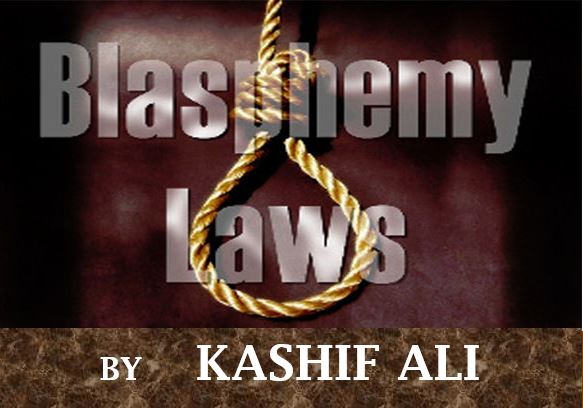The independence of Pakistan gave Muslims of the Subcontinent an opportunity to observe and protect their rights in a state that was built on the notion of Islam – at least this is what our historical books say. When Pakistan came into existence on 14 August 1947, the Government of India Act, 1935, with some major changes, falling in line with the aims of the Lahore Resolution, was enacted by unicameral legislature to run the country affairs. It was an interim constitutional conduit until the Pakistanis could make their own proper constitution. The interim constitution included laws against blasphemy, and at the same time, Pakistan’s top-notch personality, Muhammad Ali Jinnah, had declared religious freedom to all the minorities of newfangled Pakistan. At that time the laws against blasphemy seemed a blessing and their misuse was not in anyone’s mind; but, things took a turn with the passage of time.
The history of anti-blasphemous laws in Subcontinent India goes back to the 1920s, when a pamphlet was written against the Holy Prophet (PBUH) by an anonymous Hindu writer in 1924, inciting a strong condemnation by the Muslim fraternity in United India. In 1927, a boy named Ilm Deen assassinated the alleged writer with a knife. Muslim majority hailed this assassination as something divine and a revered deed. However, the British government at that time, under the Indian Penal Code (IPC), sentenced the boy to death. Later on, succumbing to the incessant pressure of the Muslim population, the British government added a law in their constitution that curbed any derogatory or blasphemous remarks against any religious personality. Much to Muslims’ dismay, Ilm Deen was hanged in 1929. He is regarded as a hero in the history of Muslims of India, having a shrine in Lahore where he is interred.
The steps to curb blasphemy are an important aspect in those countries where religion holds a prominent position. These laws can be traced back to biblical times. Mostly the Muslim countries such as Saudi Arabia, Iran, Turkey, and Pakistan have inculcated such laws in their constitution. At one hand, it is indispensable to make such laws: while at the other, misuse of such laws in a society is inevitable. In case of Pakistan, laws against blasphemy led to vigilantism (taking the laws and order in one’s hand). Vigilantism in the name of religion has become a common practice in Pakistan. Mostly the Muslims settle their vendettas and animosity using the pretext of these laws. One such example is the declaration of The Qadiyani community as Kafirs, in 1974, in an amendment in the 1973’s constitution of Pakistan. Ordinance XX, issued by General Muhammad Zia-ul-Haq further tightened the rope around the Qadiyani community, preventing them from calling themselves Muslim. The book Pakistan Under Siege: Extremism, Society, and the State, written in 2018 by Madiha Afzal, asserts that after the legal Islamization by General Zia ul Haq, the cases of misuse of anti-blasphemous law from the 1980s to 2010s surged from 23 to 85 percent. Moreover, the US Commission on International Religious Freedom reports that 80 percent of those who are prosecuted in the name of blasphemy are, in fact, unaware and innocent.
There are numbers of examples to give where vigilantism was exercised in Pakistan. A major incident happened on 3rd December 2021, where a Sri Lankan man, who was a manager at a factory in Sialkot, was lynched and set on fire by a mob of lunatics. This incident not only tarnished Pakistan’s image in the International community but showed the barbaric face of the people living in the state. So far the six accused have been sentenced to death by the Anti-Terrorism Court (ATC), while 9 have been given life imprisonment. Unfortunately, those who have been prosecuted are yet to be hanged. A similar incident took place on 4 November 2020, in Khushab, Punjab, where a bank guard shot dead the manager of the bank over a petty issue of the timing of Namaz (a practice exercised in Islam). Although the issue was trivial, and not in any sense the victim had to be shot, the guard was hailed as a Mujahid (a warrior) and he was adored with garlands and salutes. In 2011, The Governor of Punjab, Salman Taseer, was assassinated by his personal bodyguard, Mumtaz Qadri, on the accusation of blasphemy. Hence, the killer was hanged in 2016, but he is still considered a hero by most of Pakistanis.
In 2010 and 2011, Sherry Rehman, Pakistan’s top diplomat and the currently serving Minister of Climate Change institution of Pakistan, censured the anti-blasphemy laws, regarding them as tool of vigilantism and personal feuds. She remarked that if those who were accused of blasphemy were to be punished, same should be for those who alleged, wrongly, the persons who had been victimized or framed for things they had not done, i.e. blasphemy. This enraged the extremist so much that she received death threats and was confined in a house arrest for almost a 6-month time period.
Article 295 and its clauses, in the constitution of Pakistan, provide a definite solution to curb any derogatory and sacrilegious remarks against the revered personalities of Muslim faith; but, at the same time, it leads to extremism and vigilantism. A proper prosecution and investigation should be carried when such cases pops up. And those who accuse an individual without evidence, and later on that accused is proven not guilty, should be punished harshly to deter vigilantism and unjust persecution. Such initiatives will not only promote harmony, but they will result in a good-reputed image of Pakistan at the International level.

